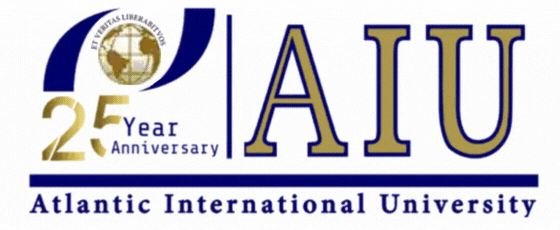- RESEARCHDistance Learning at AIU is enhanced by vast academic resources and innovative technologies build into the Virtual Campus: Hundreds of self-paced courses with video lectures and step by step lessons, thousands of optional assignments, 140,000 e-books, the Social Media & Networking platform allowing collaboration/chat/communications between students, and MYAIU develop students holistically in 11 areas beyond just academics.
- PROGRAMS OFFERED
- Areas of Study
- Courses and Curriculum
- Open Courses
- Register for a Program
- Associate Program
- Associate in Addiction Counseling
- Associate in Agriculture Food And Resources
- Associate in Anti Terrorism Security
- Associate in Behavior Analysis In Special Education
- Associate in Bioethics
- Associate in Climatology
- Associate in Cultural Theological Communication
- Associate in Culinary Arts
- Associate in Ecotechnology
- View all Associates Programs
- Bachelor Program
- Bachelors in Community Development
- Bachelors in Environmental Science
- Bachelor in Education (B.Ed, BS)
- Bachelors in Economics
- Bachelors in Entrepreneurship
- Bachelors in Financial Administration
- Bachelors in Human Resource Management
- Bachelors in Linguistics
- Bachelors in Nutritional Science
- Bachelors in Occupational Health and Safety
- Bachelors in Psychology
- View all Bachelor Programs
- Doctorate Program
- Doctor | of Biology (PhD)
- Doctorate in Business Administration (DBA, PhD)
- Doctor of Economics (PhD)
- Doctor of Electrical Engineering (D.Sc, PhD)
- Doctor of Finance (PhD)
- Doctorate in International Relations
- Doctorate in Information Technology (D.Sc)
- Doctor of Legal Studies (PhD)
- Doctor of Project Management (PhD)
- Doctor of Sociology (PhD, D.Sc)
- Doctorate in Sustainable Natural Resources Management
- View all Doctorate Programs
- Master Program
- Postdoctoral Program
- Postdoctoral in Animal Science
- Postdoctoral in Anti Terrorism Security
- Postdoctoral in Behavior Analysis In Special Education
- Postdoctoral in Bioethics
- Postdoctoral in Blockchain Technology and Digital Currency
- Postdoctoral in Business Management
- Postdoctoral in Cloud Computing
- Postdoctoral in Computer Engineering
- View all Postdoctoral Programs
AIU offers a wide range of majors in areas including the Arts, Business, Science, Technology, Social, and Human studies. More than 120 degrees and programs are available for adult learners at the associate’s, bachelor’s, master’s, doctoral and postdoctoral level. - VIRTUAL CAMPUS
Distance Learning at AIU is enhanced by vast academic resources and innovative technologies build into the Virtual Campus: Hundreds of self-paced courses with video lectures and step by step lessons, thousands of optional assignments, 140,000 e-books, the Social Media & Networking platform allowing collaboration/chat/communications between students, and MYAIU develop students holistically in 11 areas beyond just academics.
- ALUMNI
The world is YOUR campus!”, that is the message of AIU’s month magazine Campus Mundi. Hear the voices and see the faces that make up AIU. Campus Mundi brings the world of AIU to you every months with inspirational stories, news and achievements by AIU members from around the world (students and staff are located in over 200 countries).
• Structural Materials
Overview of Structural Materials: Properties, Advantages, and Disadvantages
This document provides a comprehensive overview of structural materials, focusing on concrete, steel, and timber. It discusses their properties, advantages, and disadvantages, including aspects like toughness, fatigue, corrosion resistance, and issues such as swelling in timber and fire resistance in steel. It serves as a valuable resource for construction professionals.

The document offers an in-depth exploration of structural materials, specifically focusing on concrete, steel, and timber. It begins with an introduction to the importance of these materials in construction and their various applications.
In the section on concrete, the document discusses concrete mix design, emphasizing the significance of selecting the right proportions of materials to achieve desired strength and durability. It outlines the properties of fresh concrete, including workability and setting time, as well as the hardened properties such as compressive strength and durability. The advantages of concrete as a structural material are highlighted, including its high compressive strength, fire resistance, and versatility in various construction applications. However, it also addresses the disadvantages, such as susceptibility to cracking, low tensile strength, and the need for proper curing.
The section on steel delves into its types and properties, including ductility, hardness, toughness, fatigue resistance, and corrosion resistance. Toughness is defined as the ability to absorb energy up to fracture, typically measured by the area under the stress-strain curve. The advantages of using steel as a structural material are discussed, such as better quality control, lighter weight, faster erection times, and superior lateral load behavior, which enhances earthquake resistance. Conversely, the disadvantages include the requirement for skilled labor, higher construction costs, maintenance challenges, and poor fireproofing at elevated temperatures.
The document also covers timber, detailing its structure and types, including softwoods and hardwoods. It emphasizes the durability and versatility of timber, noting its adaptability to various shapes and resistance to extreme weather conditions. The cost-effectiveness of timber is highlighted, particularly in terms of speed of construction compared to steel or masonry. Additionally, timber provides excellent insulation properties, making it an environmentally friendly option due to its renewable nature. However, the disadvantages of timber are also discussed, including issues related to swelling and shrinkage, condensation, and fire resistance, which can compromise structural integrity.
In conclusion, the document notes that while reinforced concrete remains the most widely used structural material, the use of steel has significantly increased in recent years due to advancements in design and fabrication techniques. Overall, the document serves as a valuable resource for understanding the properties, advantages, and disadvantages of various structural materials used in construction.
Atlantic International University
Get to know the AIU experience
Contact Us Today!
We understand how busy adults do not have time to go back to school. Now, it’s possible to earn your degree in the comfort of your own home and still have time for yourself and your family. The Admissions office is here to help you, for additional information or to see if you qualify for admissions please contact us. If you are ready to apply please submit your Online Application and paste your resume and any additional comments/questions in the area provided.
Pioneer Plaza
900 Fort Street Mall 905
Honolulu, HI 96813
800-993-0066 (Toll Free in US)
808-924-9567 (Internationally)
808-947-2488 (Fax)
AIU Success Stories







Contact Us Today!
Begin Your Journey!
AIU’s Summer of Innovation and Growth gives you the ability to earn up to $5000 in tuition credit by completing free lessons and courses.
Whether you’re looking to acquire new skills, advance your career, or simply explore new interests, AIU is your gateway to a world of opportunities. With free access to 3400 lessons and hundreds of courses the ability to earn credits and earn certificates there’s no better time to start learning.
Join us today as a Guest Student and take the first step towards a brighter, more empowered future.
Explore. Learn. Achieve.
Degrees

Contact Us
Atlantic International University
900 Fort Street Mall 905 Honolulu, HI 96813 [email protected]
Quick Links
Home | Online Courses | Available Courses | Virtual Campus | Career Center | Available Positions | Ask Career Coach | The Job Interview | Resume Writing | Accreditation | Areas of Study | Bachelor Degree Programs | Masters Degree Programs | Doctoral Degree Programs | Course & Curriculum | Human Rights | Online Library | Representations | Student Publication | Sponsors | General Information | Mission & Vision | School of Business and Economics | School of Science and Engineering | School of Social and Human Studies | Media Center | Admission Requirements | Apply Online | Tuition | Faculty & Staff | Distance Learning Overview | Student Testimonials | AIU Blogs | Register for Program | Privacy Policy | FAQ



















